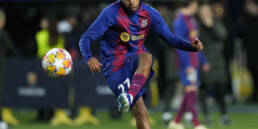He grew up on bread and Dybala. In the sense that ever since Tommaso Baldanzi entered Empoli’s youth sector at the age of 8, the Argentine world champion has been his role model. Today that Baldanzi is 20 years old and the Roma player is 29, the vice Under-20 World Champion, an attacking midfielder, who was born a striker, became a midfielder and then landed in the new role that enhances his class and technique, is the jewel in the crown of the Tuscan club, 103 years old, playing in Serie A for the 17th time in its history.
Empoli is a model club, has accounts in order and lives a happy age, shaped by Fabrizio Corsi, immaculate president for thirty-two years, assisted by his vice-president daughter, Rebecca da who has always had as a must the enhancement of its talents. How can we not mention Totò Di Natale and Vincenzo Montella, Luciano Spalletti who was later also its coach, Eusebio Di Francesco and Daniele Rugani, Samuele Ricci, Guglielmo Vicario new Tottenham’s goalkeeper and Kristjan Asslani, the Inter player who now so likes Roberto De Zerbi’s Brighton. Just to recall a few of the players who grew up in the shadow of the stadium named after Carlo Castellani (1909-1944) the Empoli’s legend, the second highest scorer in the club’s history, who was killed by the Nazis in the Gusen concentration camp under Mauthausen, where he had been deported. Castellani’s memory is always alive in Empoli, a club that has also built a solid reputation of coaches: among others, the aforementioned Spalletti, Malesani, Sarri, Giampaolo, Dionisi, now Zanetti.
An expression of a municipality of 50.000 inhabitants that belongs to the metropolitan city of Florence, from which a proud sporting rivalry divides it, Empoli finds in its team a great source of pride and belonging. Baldanzi, who was born 40 kilometers from Empoli, embodies to perfection the archetypal of Empoli footballer: talented, attached to the team’s jersey, brave. Great dribbling, swaggering just right, fearless to the extent that in his first year in Serie A, where he made his debut at age 19, he scored four goals.
Tommaso loves Club Italia. In Argentina, at the Under-20 World Cup that saw Nunziata’s national team defeated in the final by Uruguay, Baldanzi impressed. Step by step, Tommaso has played in the Under 17, Under 18, Under 19, Under 20 precisely and has already made his debut also in the Under 21, of which he will be a milestone in the new two-year period entrusted to the same Nunziata. Meanwhile, Baldanzi has also participated in a stage for Mancini’s Italy. Empoli has armored him until 2027, knowing how much Juve, Milan and Fiorentina like him. Baldanzi is a jewel destined to shine more and more.
And, to tell the whole story, Jagoba Arrasate (Berriatua) also came through the ranks of Real Sociedad’s youth academy, but, just like the wise José Luis Mendilibar (Zaldibar), he’s originally from Bizkaia, the province associated with Bilbao. Similarly, the successful Basque coaching family also includes Ernesto Valverde and Didier Deschamps. Both with an asterisk. The coach of Les Bleus, in fact, was born in Bayonne, a stronghold of the French Basque Country, while Txingurri (ant in Basque) has Extremaduran blood, even though he moved to Vitoria with his parents when he was just seven months old. And it’s for this reason that even the current coach of Athletic Club Bilbao, who won two La Liga championships with Barcelona (and would have won the third if he hadn’t been dismissed despite his Barça being first in the standings), can and should be considered a true Basque.
From Mendilibar’s 62 years to Iraola’s 40, there are four generations of Basque coaches born within a radius of less than 100 kilometers, and, as Mikel Etxarri, the coach of Euskadi (the Basque national team) and mentor to many of them, puts it, “they don’t do anything special. I believe that if there’s one aspect that unites all these guys, it’s hard work. We are a people educated in labor.” Mendi, after taking over Sevilla last March when they were deep in the relegation zone, managed to lead them to the Champions League thanks to their victory in the Europa League final against José Mourinho’s Roma, and after eliminating, in his European debut, two other European giants: Juventus and Manchester United. Speaking of continental competitions, Arrasate, a physical education teacher on leave, brought Osasuna back to Europe (Conference League) 16 years after the last time. Imanol’s Real Sociedad finishing fourth, on the other hand, is no longer a surprise, just as everyone was sure that Iraola would do well leading Rayo Vallecano. However, no one could have imagined that the obrero club from Madrid would flirt with European placements until the end. It’s no coincidence that Bournemouth decided to bring him to the Premier League, adding him to the already long list of Basque coaches in the English top flight. Besides Arteta, Emery, and Lopetegui, who also teach their lessons every damn Sunday from their posts in Birmingham and Wolverhampton, Xabi Alonso came up through Real Sociedad’s youth academy, played for some of Europe’s most important clubs (Liverpool, Real Madrid, and Bayern Munich), and was coached by the best managers in the old continent (Rafa Benitez, José Mourinho, Carlo Ancelotti, and Pep Guardiola, in addition to Luis Aragonés and Vicente Del Bosque in the national team). Alonso, however, began his coaching career on a top-level bench (after starting over in the txuri urdin youth sector) in Leverkusen, managing to take Bayer to the Europa League semifinals after taking over midseason. There are very few doubts about him: he’s one of the main candidates, in fact, to succeed Ancelotti on the Real Madrid bench.
Cast your preference on Tuttosport.com


